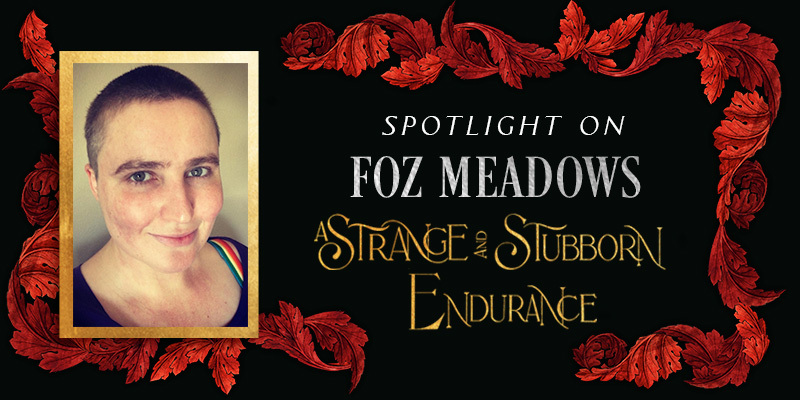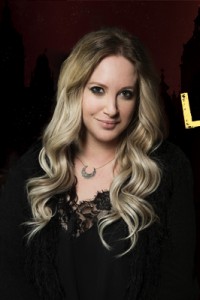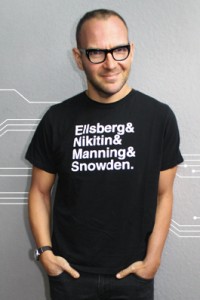Spotlight on: Foz Meadows
 Tell us about your newest novel, A Strange and Stubborn Endurance: the world where it takes place, and the characters who inhabit that world.
Tell us about your newest novel, A Strange and Stubborn Endurance: the world where it takes place, and the characters who inhabit that world.
The protagonists of A Strange and Stubborn Endurance, Velasin and Caethari, are noblemen from neighbouring but very different countries. In Ralia, Vel has had to conceal his queerness, whereas in Tithena, Cae has grown up in a culture of acceptance. When Vel is offered a diplomatic betrothal to Cae’s younger sister, though shocked and unhappy, he’s prepared to go through with it for duty’s sake. But when an assault at the hands of his former lover leads to Vel being outed (though the rape isn’t recognized as such by those who witness it), the Tithenai envoy proposes an alternative solution: for Vel to marry Caethari instead. Because of this, the story starts out in a dark place, with Vel struggling to reconcile what’s happened to him with his forthcoming marriage, but emotionally, his trajectory is one of healing. But once he meets Caethari and slowly begins to trust him, there are other things to contend with: an unknown faction is set on ending the alliance, and the two men have to trust each other to survive.
Will you return to the setting of this book in future work, or is it a standalone?
I’m actually writing the sequel right now! I don’t want to say too much, but the story picks up soon after the events of A Strange and Stubborn Endurance, and addresses some of the wider implications of Vel and Cae’s marriage, as well as exploring how they work together.
Your novel includes elements of political fantasy and queer romance. What authors of either (or both!) have influenced and inspired you?
My favourite queer romance author is K.J. Charles; her work is just phenomenal. Writing, characterization, plot, historical research – everything. There’s only a few of hers left that I haven’t read and I have to ration them, because they’re the kind of books where, even if you know you’ll return to them, you still only get to read them for the first time once. As for political fantasy, I grew up reading Kate Elliott, who does politics (among other things!) superbly; more recently, I’ve also adored both the politicking and queer romance in Aliette de Bodard’s work. But honestly, anytime I read something good, regardless of the genre – and that’s often, because there’s so much good stuff out there, including fanfiction – even if I’m not actively taking mental notes, my brain is always subconsciously squirrelling away little nuggets of inspiration.
 This is your fifth novel (and you’ve published a novella, too). Can you describe your journey from aspiring writer to multiple-published author?
This is your fifth novel (and you’ve published a novella, too). Can you describe your journey from aspiring writer to multiple-published author?
This is going to be a long answer, because I’ve had a lot of ups and downs, and with the book about to come out, I’ve been reflecting a lot on what led to it. I wanted to be a writer from age eleven, though I’d started writing for fun before then. I was always reading, always writing. In high school, I spent years working on what I now call the GUE, the Great Unpublished Epic, only to work on it more while at university. I was working as a legal PA by the time I started submitting it, and while it was on sub, inspired by my belatedly discovery of Buffy the Vampire Slayer, I accidentally started work on a YA urban fantasy manuscript. When that was done, I started submitting it, too, because why not – and to my surprise, that was what got me noticed by an agent. However, they ended up closing their business shortly thereafter due to health reasons, which at the time felt devastating.
Not wanting the same thing to happen again, I started submitting directly to publishers, and ended up signing a contact with a local Melbourne publisher, Ford Street. My first book – the vampire book, Solace & Grief – came out in 2010, when I was 24. It was only a small release, but it meant the world to me: I was an author! Solace earned out, but by the time the sequel, The Key to Starveldt, was released in 2011, two key things had changed: I’d moved to the UK, and the Borders bookstore chain had collapsed, which had a catastrophic effect on the Australian publishing industry. Almost nobody was buying indies, I couldn’t do any in-person events to compensate, and even though the series was meant to have been a trilogy, the publisher ended up declining the third book.
Being unagented, this landed me back to square one. However, I’d also been blogging steadily for years – more because I’m terminally opinionated than because I thought it would actually go anywhere – and in 2014, I somehow ended up with a Hugo nomination for Best Fan Writer, which helped me attract a new agent. With her help, I sold my Manifold Worlds duology to Angry Robot, as well as contributing my Shakespearan novella, Coral Bones, to an anthology with Rebellion. An Accident of Stars came out in 2016, followed in 2017 by A Tyranny of Queens, but by then I’d once again moved countries – this time, from the UK back to Australia – which, as with Starveldt, put me at something of a disadvantage re: in-person promotions. And then… well. Unpleasantness happened. Just before the release of Tyranny, the relationship with my agency went badly wrong, to the point where I had to leave them. I won’t rehash the details here, but it was a really rough time; I’d been advised not to speak publicly about how I’d been treated, and that imposed silence compounded what had happened. It was ugly and dispiriting, and though I was still writing behind the scenes, on some level, I felt like I’d lost my career forever.
And then, in 2020, the head of my former agency did something on social media which prompted all but one of her agents to resign in protest. This led to discourse about whether the resignations were a performative overreaction and whether the agency head was being treated unfairly. By that point, I’d moved countries again – this time to America – and had, to my shock and delight, actually won a Hugo Award for my blogging. I was in a better headspace mentally than I had been for some time and, after three agentless years of struggling to write at all, felt like I had nothing more to lose. So I finally wrote about my experience with the agency head; how she’d treated me, and on what justification. The catharsis was stunning and immediate; I felt like a weight had been lifted. My piece led to several other writers coming forward with similar stories of unprofessional conduct, and as the story spread, a handful of agents reached out to me, offering to look at my work and see if we might be a fit. That’s how I wound up with my present agent, Hannah Bowman, who is absolutely wonderful. Even though the draft of what would become A Strange and Stubborn Endurance was still unfinished, she took a chance on me, and so I went into a writing frenzy to finish it, wanting her to have something to shop around. When Tor ended up acquiring it in a pre-empt, I just about fell over! And now it’s nearly out, and I’m feeling some kind of way about it all.
So, that’s my publishing journey. It’s been weird and hard and complicated, but I’ve clung on like a bloody-minded limpet, because honestly, I’m not much fit for any other work, and even when I didn’t think the industry wanted me, I still wanted stories.
You’re from Australia, and currently live in the US. Do those different landscapes influence your work in different ways? Have you had any instances of culture shock or things you didn’t expect from the States?
Growing up, my biggest beef with fantasy landscapes was the geography: the northern hemisphere default, which carried over to fiction, was always hot souths and cold norths, whereas in Australia, it’s the other way around. So even now, when I lay out a fantasy setting, I tend to have an antipodean view of it: hot north, cold south. As for being in the US, I wouldn’t call it culture shock so much as culture surprise: in addition to Australian and UK content, I grew up with American music, TV, movies and books, but it wasn’t always clear which cultural details were exaggerated for narrative effect, which were extremely localized, or which were broader norms. As such, coming to the US for the first time felt a bit like walking into a Hollywood backlot that was partially merged with the real world, trying to pick out the sets from the actual buildings – the difference between learning something academically and seeing it in context.
Even so, nothing has yet been weirder than realizing that ads for medication here really are as jarring as the ones I’d seen parodied in American TV shows, where there’s some lovely shot of a family playing in a park while the cheerful voiceover talks about how possible side effects can include paralysis, coma and death. In countries with socialized healthcare, only over the counter meds like painkillers or nasal sprays get advertised, because the hospitals are the buyers for the stronger stuff, not the public. You don’t have to “shop” for medication according to your budget or what your insurance covers; you just go through options with your doctor. The extent to which the US healthcare system is run as a business is really messed up!
You’re not just an accomplished fiction writer, but also a Hugo Award Winner for your non-fiction. Talk a bit about your literary and media criticism.
There’s a famous xkcd comic strip where a stick figure, hunched over a laptop, declines to be called away to bed. “I can’t,” they say. “Someone is wrong on the internet.” This comic is me to a frankly embarrassing degree. I started my current blog on 2008, to ramble and review things and talk about whatever caught my attention, but once I started commenting on various goings-on in the SFF/YA corners of the internet, I found myself with an audience. Looking back, there’s arguments I wouldn’t make now, or which I’d make in different language if I did; some work I’m still proud of, while other pieces are cringeworthy. It’s a mixed bag! But as with my early novels, writing those older pieces is what got me to where I am now: they’re not perfect, but they’re proof of progress, and I think that counts for something. My blogging pace has slowed down a lot the past two years, though I am tweeting more. The impulse to yell about everything is still there – I’m just trying to manage it better, with a greater awareness of the ways in which social media can make things worse. Hopefully that’s growth? Who knows!
Is there anything else you’d like our readers to know? Upcoming work or other projects of note?
An Accident of Stars is getting rereleased this June with a shiny new cover! It’s also been re-edited, which I’m super excited about; thanks to a virus that bricked the document right before the print deadline, a ton of formatting errors snuck into the original book, and now I’ve been able to fix them! I’ve also got a queer SFF novella, Finding Echoes, coming out from Neon Hemlock in 2023, which I’m thrilled about, and as mentioned, I’m currently writing the sequel to A Strange and Stubborn Endurance. There’s a lot going on right now, but as busy as I am, it’s wonderful, because it means I’m still here.









